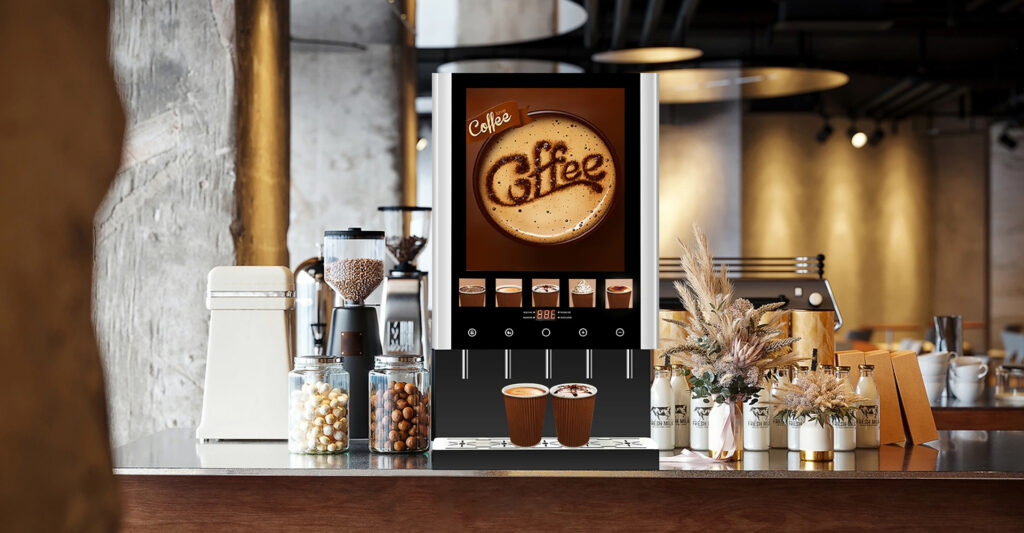As a coffee machine export manager with over a decade of experience working with global café owners, office managers, and hospitality businesses, I’ve seen countless clients make the same mistake: rushing into a vending coffee machine purchase without first mapping their unique needs. The result? Oversized units that gather dust, underpowered models that can’t keep up with morning rushes, or machines with hidden maintenance costs that drain profits.
Whether you’re a small café owner looking to add automated sales or a corporate office aiming to upgrade your breakroom, selecting the right vending coffee machine is about more than just “buying a machine”—it’s about aligning technology, capacity, and cost with your daily operations. Let’s break down the key factors to consider, so you can invest in a machine that works for you, not against you.

1. Start with Your Daily Volume: Size Matters (But Not in the Way You Think)
The first question I ask clients is: “How many cups do you serve (or want to serve) daily?” Vending coffee machines are often labeled by “cups per hour,” but this metric only tells part of the story.
- Small Spaces, Steady Demand: A cozy café with 50–100 cups/day might thrive with a compact, single-serve machine (e.g., pod-based or manual-fill models). These units take up minimal counter space, require less upfront investment ($800–$2,000), and are easy to train staff on. For example, a boutique coffee shop in Barcelona recently switched from a bulk brewer to a pod vending machine; their morning queue dropped by 30% because customers could grab a coffee in under 30 seconds without waiting for baristas.
- High-Traffic Zones: Cafés serving 200+ cups daily or office buildings with 500+ employees need industrial-grade machines. Look for models with dual boilers (to brew espresso and steam milk simultaneously), high-capacity bean hoppers (5–10 lbs), and rapid brewing cycles (under 2 minutes per cup). A client in Seoul’s Gangnam district, whose café sees 400+ customers during peak hours, now uses a 3-group super-automatic machine—its “no wait” feature boosted sales by 25% in the first month.
2. Functionality: Match Features to Your Customer Base
Vending coffee machines range from basic “push-button” models to smart, app-connected units. The right features depend on who your users are:
- For Cafés (Customer Self-Service): Prioritize ease of use and customization. Customers expect to adjust strength, milk quantity, and add-ons (syrups, cinnamon) without confusion. Machines with touchscreen interfaces, pre-set drink profiles (“cappuccino,” “flat white”), and clear pricing displays reduce errors and speed up service. A client in Melbourne added a “favorite drink” memory feature to their machine—loyal customers now save 10 seconds per order, cutting wait times significantly.
- For Offices (Employee Use): Focus on convenience and low maintenance. Employees don’t want to clean the machine or refill beans daily. Look for models with auto-rinsing cycles, removable drip trays, and large water tanks (6–10L). One of our corporate clients in Singapore chose a machine with a “monthly self-clean” reminder—staff compliance jumped from 40% to 90%, reducing service calls by 60%.
3. Cost vs. Long-Term Value: Don’t Just Shop by Price Tag
It’s tempting to go for the cheapest machine, but hidden costs can erode profits. Here’s what to factor in:
- Upfront Investment: Pod-based machines are cheaper ($500–$1,500) but lock you into proprietary pods (which cost 20–30% more per cup than ground coffee). Bulk-brew machines ($2,000–$5,000) use fresh grounds, reducing long-term supply costs. For a café serving 300 cups/day, switching from pods to bulk brewing saves ~$500/month in bean expenses.
- Maintenance & Repairs: Cheaper models often have shorter lifespans (2–3 years) and require expensive part replacements (e.g., $300+ for a new brew head). Industrial-grade machines ($5,000–$15,000) come with 2–5-year warranties and easier access to OEM parts. A client in Berlin learned this the hard way: their $800 machine broke down 6 times in 2 years; replacing it with a mid-range model cut repair costs by 70%.
4. Space & Compliance: Don’t Overlook the Details
Even the best machine is useless if it doesn’t fit your space or violates local regulations:
- Dimensions: Measure your counter height, width, and depth. A tall machine might block sightlines in a small café; a bulky unit could overflow in a narrow office breakroom. We always recommend 3D space planning tools—our clients love our “fit-check” service, where we send digital mockups of the machine in their space before shipping.
- Regulations: Many countries require vending machines to have energy-saving labels (e.g., EU’s Ecodesign Directive) or child-lock features (for public spaces). In the U.S., FDA food-contact standards mandate BPA-free materials. Our export team handles compliance documentation, so you don’t have to worry about customs delays.
5. Partner with a Supplier Who Understands Your Business
As a supplier, my goal isn’t just to sell machines—it’s to help you build a profitable coffee program. Here’s how we support clients:
- Customization: Need a machine with your café’s logo? We offer laser engraving and custom color options. Want to stock regional beans? We can integrate a bean hopper that holds 3 different blends.
- Training & Support: We provide video tutorials, on-site setup (in select regions), and a 24/7 helpline for urgent issues. One of our hotel clients in Dubai had a machine glitch during peak check-in—we dispatched a technician overnight, saving them $2,000 in lost revenue.
- Analytics: Smart machines (like our Sheen Pro Series) connect to cloud platforms, tracking daily sales, popular drinks, and maintenance needs. This data helps you adjust your menu—for example, a café in Paris noticed 40% of sales were lattes, so they added a second milk frother to reduce wait times.
Final Thoughts: Your Vending Machine Should Grow with You
A great vending coffee machine isn’t a one-time purchase—it’s a tool that evolves with your business. Whether you’re a café aiming to boost foot traffic or an office looking to improve employee satisfaction, the key is to balance functionality, cost, and space.
At Sheen, we’ve spent 15 years refining our craft, working with everyone from independent baristas to Fortune 500 companies. We understand that no two businesses are the same—and neither are their coffee needs.
Ready to find the perfect vending coffee machine for your space? Visit our [Sheen Blog]for in-depth reviews, case studies, and “how-to” guides on everything from machine maintenance to boosting sales with specialty drinks. Have questions about specs, pricing, or logistics? Drop us an inquiry—we’re here to help you serve up success, one cup at a time.

